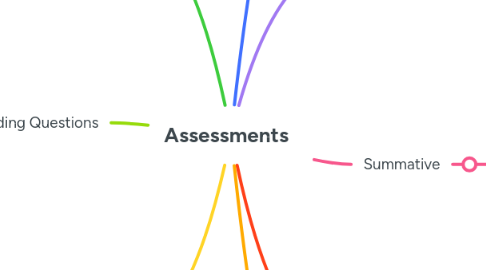
1. Opening Questions
1.1. What is an example of an addition word problem?
1.1.1. picture
1.2. How would you describe the process of adding a number?
2. Guiding Questions
2.1. What are some strategies we can use when we are reading word problems and determining if we need to add?
2.1.1. picture
2.2. Why are key words significant when we are reading word problems?
3. Closing Questions
3.1. How would you solve a word problem that asks you to add?
3.1.1. picture
3.2. If you were to design a word problem with addition, what would it be?
4. Formative
4.1. Definition: A type of assessment that is given to the students throughout the school year and guides the teacher instruction. It is an ongoing process.
4.1.1. Example: Students will respond to a padlet at the end of a lesson that asks a question about the material covered.
4.1.2. Example: Students will give a thumbs up or thumbs down if thy understood the material that was covered at the end of class.
5. Interim/Benchmark
5.1. Definition: An assessments that determines where the students are in their learning and if they are at the level that they need to be on to advance.
5.1.1. Example: A teacher takes a running record on a student and determines their reading level and fluency.
5.1.2. Example: Assessment that students are given at the end of a unit that determines what the teacher will teach next.
6. Summative
6.1. Definition: To assess students at the end of a unit to see if they have met a benchmark or standard that was set for them.
6.1.1. Example: Students take an end of semester test that shows what they have learned in the past semester.
6.1.2. Example: A final report that students write explaining their learning over a unit.
7. Performance
7.1. Definition: Showing exactly what a student knows by open ended tasks such as a project or performing an activity.
7.1.1. Example: Student gives a speech about the material that was presented to them and they have a time requirement.
7.1.2. Example: Students will write a short story and will have to read it aloud and act it out.
8. Diagnostic
8.1. Definition: Using information about a student to determine their strengths and weaknesses and determining a plan to help them in their education.
8.1.1. Example: Diagnosticians can interview the student and use a survey to measure them.
8.1.2. Example: Mind maps are a great way to organize information and see the strengths and weaknesses.
